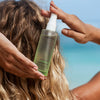Each of us has our own unique skin goals, the checkpoints on our ‘ultimate glow’ mood boards that we’re working towards. With such a diverse range of what we all want from our skin, no two people’s aims are necessarily going to be the same. We know that often deciding where to work backwards from when you’ve got the end of the journey in sight can be an overwhelming prospect. To help out, we thought we’d pull together some of the goals we hear most commonly from our Tropic community and guide you through those first steps on the journey to your dazzling destination. Welcome to Glow Academy...
If your aim is to show the eye area some love, we’d imagine you want answers on dark circles. It’s about time these stubbornly incorrigible visitors came out of the shadows, so we’re turning up the spotlight on everything you need to know.
So, what exactly are dark circles?
The skin around your eyes is the thinnest on your entire body so naturally it doesn’t have much of a poker face when it comes to letting you know how it feels.
For many people, dark circles are completely genetic, so it’s just their eyes’ way of saying ‘hi, I’m here existing today’ – no action necessary.
For those who aren’t used to experiencing them 24/7 however, their emergence often translates as your eyes alerting you that there’s something else going on that needs your attention. In these situations, what we’re seeing as more sallow-toned skin around the eyes is the result of two things; the thinning of this area, making blood vessels reddish-brown in hue more visible, and increased puffiness which gives a shadowy effect to the skin.
What causes dark circles?

While lack of sleep isn’t the overriding contributor to dark circles, fatigue can still have a major impact. Going without a regular seven to eight hours of snooze an evening can end up disrupting regular blood circulation to this sensitive area, causing your skin to become pale and blood vessels to stand out more prominently.
High levels of sun exposure also have a part to play (although we wouldn’t blame you for thinking that doesn’t impact us here in the UK). With more time ray-basking comes an increased chance of hyperpigmentation as the body produces more melanin, which then darkens your skin.
As skin grows more mature, it’s very common for circles to develop in unison with elasticity and collagen levels decreasing. Add the fact that skin also naturally loses thickness over time, and it’s natural that the already thin tissues around the eyes show the effects.
It’s a digital world, and we’re all just living in it, but with that comes the need to temper our screen use, as focusing on our phones and laptops for too long can really have a straining effect on eyes. That screen-stress then results in enlarged blood vessels in the under-eye area.
The link between seasonal allergies and dark circles may seem odd at first, but the sniffles of the pollen-packed summer months can lead to heavy sinus congestion, which dilutes blood vessels and makes them more visible. Plus, the classic watery eyes and itchiness of hayfever have us rubbing at this area consistently, causing broken blood vessels and puffiness which show up as (drum roll, please) dark circles.
How can I reduce the appearance of dark circles?
- Life’s twists and turns don’t always lend themselves to a regular sleep routine, but try to doze for eight hours a night, with your head elevated to avoid any fluid pooling around the eyes and causing puffiness. Help yourself transition into slumber seamlessly by making your room a screen-free zone for an hour before bed, as the blue light from phones and televisions has been shown to disrupt sleep cycles.
- From the height of a heatwave to the bleak midwinter, don’t go a day without SPF protection to keep hyperpigmentation at bay. To get the most out of your sunscreen, choose a broad-spectrum option that guards against UVA and UVB rays. Oh, and don’t forget your sunglasses every time you leave the house. Who doesn’t want to protect their skin while looking as chic as possible?
- Moisturising makes the skincare world go round, but show your eyes extra TLC with an individual lightweight eye cream instead. A regular moisturiser option is generally heavier, as it needs to penetrate skin that’s much thicker elsewhere on the face, and applying this to the thin epidermis around the eyes puts it at risk of congestion.
- Feeling creative? Shake things up with some homegrown remedies – all you need is some ice, a towel and a packet of tea bags. Start by applying a cold compress a few times a week, as it helps to shrink any diluted blood vessels and reduce puffiness. Immediately after, steep some tea bags and leave them in the fridge for 10 minutes (just enough time to finish off the cuppa!). Once chilled, they’ll carry on the good work the compress started, as caffeine is known to boost blood circulation.
- Whether hayfever is a sure summer bet for you or you’re hit with an impromptu case of the scratchy sniffles, bringing antihistamines on the go with you gives you a safety blanket for watery-eyed days. Good riddance to rubbing those irritated peepers!
Which ingredients are good for dark circles?

Look out for skincare which features..
Hyaluronic acid – Drawing in moisture to keep the skin around the eyes plump, this is the gold standard for hydration.
Peptides – Eye up product labels for these natural collagen-boosters to help prep the path to firmer skin.
Vitamin C – It’s a powerful antioxidant offering brilliantly brightening effects. If you feel like eating your way to a healthy glow, there’s always the tastier option of stocking up on kiwi, guava and peppers...
The dark circles FAQ
What vitamin deficiency causes dark circles? While certain vitamins can have a positive impact on dark circles, as you just found out, what you’re most likely thinking of is the connection between anaemia (iron deficiency) and dark circles. In this situation, the body’s ability to deliver oxygen to the tissues around the eyes is impaired, meaning that skin can end up appearing discoloured and shadowy.
Can lemon juice lighten dark circles? This myth pops up around dark circles time and again, and we can’t stress enough – don’t do it! Lemon has a bleaching effect so its impact is only felt at the surface level and won’t help resolve any of the underlying causes of dark circles, like elasticity and diluted blood vessels. Not to mention, it’s dangerous to be placing a product so high in concentrated acid that close to your eyes.
What food should I eat to help with my dark circles? Get ready to spend a lot of time in the fruit and veg aisle! We’ve already given a shout out to kiwi, guava and peppers, some of the most vitamin C-rich foods you can find, but you can pretty much go with the motto of ‘if it’s green, it’s good’. Hydrating cucumber, spinach and broccoli packed with vitamin K to help improve circulation, celery rich in electrolytes to decrease puffiness, blueberries (not green, but go with us here) full of antioxidants to protect blood vessels – the list is endless.

 Skincare
Skincare
 Sale
Sale
 Bestsellers
Bestsellers
 Makeup
Makeup
 Body Care
Body Care
 Men's
Men's
 Hair Care
Hair Care
 Mama & Baby
Mama & Baby
